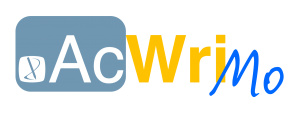 Dr. Anna Tarrant is a social scientist with a background in human geography, currently working as a Leverhulme Trust Early Career Research Fellow at the University of Leeds. She is former editor of PhD2Published.com, and reflects on the history of #AcWri in this guest post.
Dr. Anna Tarrant is a social scientist with a background in human geography, currently working as a Leverhulme Trust Early Career Research Fellow at the University of Leeds. She is former editor of PhD2Published.com, and reflects on the history of #AcWri in this guest post.
#Acwri — which stands for academic writing — is a hashtag used in online discussions about all things related to academic writing (as it is broadly defined). It has been instrumental in establishing an on-going, online participatory community, providing an open platform for sharing knowledge about academic writing (empowering each member as experts in their right) and generating useful resources in the form of summaries. Scholars of all career stages and disciplines participate in a peer-to-peer support network by sharing tips, asking questions, discussing challenges and reflecting on how they write. But where did #AcWri come from?
Origins of the hashtag
I was the editor of PhD2Published during its first ever Academic Writing Month (originally Academic Book Writing Month or #AcBoWriMo, which was eventually shortened to Academic Writing Month or #AcWriMo). Interest in academic writing didn’t end when the month came to a close and this new community continued to regularly share their academic writing wins and woes using the shortened #AcWri hashtag that had been suggested by Melissa Lovell (@melovell). Around about the same time, Dr Jeremy Segrott (Cardiff University) ran a live chat using the hashtag #writter to find out if there was any interest in establishing a twitter-based writing support group. Following this chat (and having gained permission from the existing #AcWri community), we all decided to work together to organise and run fortnightly Live Chats using the #AcWri hashtag. These took place every fortnight on a Thursday evening at 8pm GMT and each one focused on a particular aspect of the writing process.
Some of the chats we have run
The live chats have covered a wide range of topics, including but not limited to; writing journal articles, turning conference papers into journal articles, writing grant applications, finding time to write and academic writing for part-time students and researchers. The topics were identified through monitoring of ongoing discussion using the #AcWri hashtag. This was important for ensuring that each topic was of interest to the community.
Every Live Chat was summarised using Storify, an online tool for creating stories from social media content. Posted on PhD2Published and Jeremy’s blog, these are really useful resources for academic writers and provide a record of the community’s discussions.
Going global
As a result of the live chats and the increasing popularity of the hashtag, the #AcWri community continued to grow and extend its reach. Demand for a chat time more suited to Australia/Asia/South Pacific time zones also grew so we announced #acwri APAC, a live chat run at 10+ GMT. This was co-chaired by Jennifer Lim and Wini Cooke who regularly participated in the community. #AcWri APAC extended the reach of #AcWri by supporting a multi-disciplinary, international discussion forum focused around academic writing.
#AcWri today
While the live chats are no longer run, the hashtag continues to be used on a regular basis by a well-established, global and thriving academic community. #AcWri is a fantastic peer support network for academic writers of all career stages and continues to facilitate an open platform for sharing knowledge about academic writing, empowering each member as experts in their own right.

 In a previous post for PhD2Published, I mentioned that I would be talking in a symposium at the Society for Research into Higher Education Conference 2012.
In a previous post for PhD2Published, I mentioned that I would be talking in a symposium at the Society for Research into Higher Education Conference 2012.
I went last Friday (14th December 2012) and really enjoyed the experience. Professor Pat Thomson started with a really interesting talk about her project with Inger Mewburn (aka The Thesis Whisperer) about analyzing blog spaces for academic purposes, followed by Dr Jeremy Segrott who presented our talk about #acwri. Andy Coverdale spoke next about the use of social media and the way in which it aids the research process for PhD students, and then I concluded the session with discussion of how PhD2Published is an empowering space (for me in particular as Managing Editor) and one outside of institutions that is transforming academic knowledge production.
We seemed to get a good response to our papers from a really engaged audience, which was encouraging and we all commented on the strangeness of meeting face-to-face having ‘known’ each other on Twitter for so long (there is proof in the slightly blurred photo in the Storify below!). The symposium was the first real opportunity to meet up directly as a group and to share our experiences and reflections on social media use as academics.
Below is a Storify of some of the Tweets from the day that we Tweeted directly from the symposium to give an idea of what the papers were about and what we discussed:

 Tomorrow I have the pleasure of representing PhD2Published at the Society for Research into Higher Education Conference 2012. I am taking part in a symposium organized by Professor Pat Thompson of the Patter blog called ‘Feral spaces? Social media as higher education practice: Blogs, wikis, and twitter feeds with a pedagogical intent’. Pat herself will be talking, as will Andy Coverdale, a PhD student at Nottingham Trent University, UK and Dr Jeremy Segrott, my Acwri partner in crime. In the paper I am presenting, I will talk about the online participatory culture that has been created by feral spaces such as PhD2Published and that is representative of a now well-established online academic movement that is shaping new practices of knowledge production. Being online has created feral spaces like PhD2Published that are borderless and unregulated and that bridge social differences and disciplines. I reflect on this and how this movement is transforming academic knowledge production by creating a community of ‘prosumers’ (or the wonderful academics who write blogs, or share news, knowledge and ideas via social media platforms such as Twitter and Facebook). I will explore the role of PhD2Published in generating pedagogical content concerned with academic publishing from the perspectives of an expert community of academics of different career stages and will argue that PhD2Published is a unique platform that can be used by its Managing Editors (currently me) to engage in this participatory culture, with the guidance of its founder Charlotte Frost, to reskill and share expertise. I will also reflect on my own involvement with PhD2Published and the way in which it has allowed me to respond to the fast paced, ever-evolving and increasingly competitive academic environment.
Tomorrow I have the pleasure of representing PhD2Published at the Society for Research into Higher Education Conference 2012. I am taking part in a symposium organized by Professor Pat Thompson of the Patter blog called ‘Feral spaces? Social media as higher education practice: Blogs, wikis, and twitter feeds with a pedagogical intent’. Pat herself will be talking, as will Andy Coverdale, a PhD student at Nottingham Trent University, UK and Dr Jeremy Segrott, my Acwri partner in crime. In the paper I am presenting, I will talk about the online participatory culture that has been created by feral spaces such as PhD2Published and that is representative of a now well-established online academic movement that is shaping new practices of knowledge production. Being online has created feral spaces like PhD2Published that are borderless and unregulated and that bridge social differences and disciplines. I reflect on this and how this movement is transforming academic knowledge production by creating a community of ‘prosumers’ (or the wonderful academics who write blogs, or share news, knowledge and ideas via social media platforms such as Twitter and Facebook). I will explore the role of PhD2Published in generating pedagogical content concerned with academic publishing from the perspectives of an expert community of academics of different career stages and will argue that PhD2Published is a unique platform that can be used by its Managing Editors (currently me) to engage in this participatory culture, with the guidance of its founder Charlotte Frost, to reskill and share expertise. I will also reflect on my own involvement with PhD2Published and the way in which it has allowed me to respond to the fast paced, ever-evolving and increasingly competitive academic environment.
I will report on the outcomes of the symposium when I return,
Anna

 Remember AcBoWriMo, last year’s experiment in a month-long writing productivity drive? Well, it’s back, bigger and better than ever – but without the ‘Bo’!
Remember AcBoWriMo, last year’s experiment in a month-long writing productivity drive? Well, it’s back, bigger and better than ever – but without the ‘Bo’!
The idea hails from NaNoWriMo (National Novel Writing Month) an initiative designed to turn the whole of November into a month-long write-fest for current or would-be novelists. The idea is that you set yourself the task of writing 50 thousand words in November alone and bingo, you’ve got yourself a whole big chunk of novel! In 2011 I decided academics should give something similar a go and, I can happily report, it went brilliantly!
For AcBoWriMo, I invited people to join me in wearing comfy clothes, drinking a lot of coffee, napping at strange times and seeing how close we could each get to writing 50 thousand words. I admitted at the time that it was an insane target, but that it wasn’t the word count that was the point. Rather, it was a bid to gather people together for mutual support in the, at times, painfully difficult and soul-crushingly lonely task of academic writing. In the last year alone, I’ve watched with awe and excitement as so many academic communities have grown and expanded on social media platforms like Twitter (examples include #phdchat, #ecrbook, #digped, #fycchat with plenty more to be found here). Not to mention that our own AcBoWriMo off-shoot (and collaboration with Jeremy Segrott), the regular live Twitter chat on academic writing, #AcWri, has co-ordinated a huge amount of valuable discussion. Nice work Anna and Jeremy!
So I decided it was worth giving it all another go – with some revisions…
This year’s event will focus on ALL aspects of academic writing, and will encourage participants to set their own (wild) goals. As a result of that, and the strength of the AcWri community, it will be called AcWriMo. Just like Craig David, I copped some flack for the ‘Bo!’ part. Although I never intended to promote the idea that an entire academic book could be written in a month, by calling the event Academic Book Writing Month, it seems I over-emphasised that part. But we still want you to join in on setting yourself some unrealistic targets and fighting alongside us to achieve them.
So, here are the rules for #AcWriMo 2012
1. Set yourself some crazy goals. Try and come up with some outcomes that would really push you beyond anything you ever thought possible. I always said 50,000 words is a bit of a nutty goal for academic writing in one month (it works out at something like 2,500 words a day and that’s just bonkers) but if you’re bonkers, go ahead and set that target. Otherwise, think about how much you are comfortably able to write a day and set yourself the task of regularly exceeding that amount. If you can manage 300 words a day then we want 400, if you can do 1000, then we want 1500 – something like that. Last year, a lot of people preferred setting themselves a time-based goal. They would try to write for so many hours a day or week and often used the Pomodoro technique to count units of productive time. If that’s your thing, go for it! How about sneaking in an extra Pomodoro a day? Or, look at all the writing tasks you’ve got to achieve over the next few months and decide to get a set amount of them done in November. In the US it’s job season, so how about you count your job-letter-writing-time. Or article drafts maybe?
2. Publicly declare your participation and goals. You can do this by adding to the comments of this very blog post, by tweeting using the hashtag #AcWriMo, or by writing on our PhD2Published Facebook page. Being accountable is key to this working for you as a way to push yourself, but if you want to silently take part, at least tell a friend who is likely to hold you to it. [edit: you can now also add your goals to and keep track of your progress with Jenn’s AcWriMo Accountability Spreadsheet – thanks Jenn!]
3. Draft a strategy. This is essential if you’re going to make a success of this. Sitting down to write without preparation is the first step towards being struck down with writer’s block. We’ll be blogging and tweeting lots of ideas to help you, so before you start, work out a strategy for how you’ll tackle your set tasks. For example, establish how much you’ll need to write a day, and on which days you can definitely do this. Offload as much other work as you can, and get in some supplies (we recommend stocking up on decent coffee of course). Think about how you work best and adopt that approach from the start – this means planning everything from comfy clothes to reading sessions.
4. Discuss what you’re doing. OK so being on Twitter and Facebook with us all day isn’t acceptable – you’ve got work to do – but checking-in at certain times is imperative! We want to know how you’re getting on? What is working for you and what isn’t? We want you to tell us all if you need help with something but also to celebrate your successes with us too. And nothing is TMI when it’s AcWriMo because that’s the point: sharing!
5. Don’t slack off. As participant Bettina said of AcBoWriMo, you must ‘write like there’s no December!’ But guess what? If you work super hard now, there’s going to be more December to go round. Remember how December usually creeps up on you and suddenly its Christmas Eve and you’ve failed to buy gifts or take time out for yourself. Well, if you put the work in now, there’ll be so much December you won’t know what to do with it all!
6. Publicly declare your results – and please be honest! As a writing community, we’ll all benefit from sharing in your achievements, but it is also good to see what works and what doesn’t. And if you don’t make your targets, you’ll still be achieving the selfless goal of making the rest of us feel more normal – so it’s a community win/win really.
We’re raring to go, we hope you are too?! 🙂

 This week the #Acwri live chat was all about using Twitter for Academic Writing. This chat was well attended and lively and encouraged a lot of discussion. A written summary of the chat can be read in todays post but if you would like to read the chat in full, which includes the key Tweets from the discussion, you can view them on Storify.
This week the #Acwri live chat was all about using Twitter for Academic Writing. This chat was well attended and lively and encouraged a lot of discussion. A written summary of the chat can be read in todays post but if you would like to read the chat in full, which includes the key Tweets from the discussion, you can view them on Storify.
The conversation started with some reflection on why academics are using Twitter. Responses ranged from finding relevant communities of practice, keeping in touch with people efficiently and quickly, keeping networks alive, reaching a bigger audience, making connections across space and between groups, to be social, to find out about things and stay up to date, to share #acwri outputs, and to be at the intersection of multi-disciplinary conversations relevant to individual work. These responses indicate the diversity of reasons for using Twitter as an academic.
Others also consider it good for practicing concise writing (in only 140 characters), setting goals and asking questions. One user even argued that they use Twitter as a way of keeping notes (@strictlykaren). This led to some discussion about using Twitter to link to other content, such as blogs, where discussion can continue elsewhere.
A significant thread of conversation in the early stages of the chat was that many enjoy live Tweeting from conferences, but also have some concerns about it. People question when it is appropriate to do it and how often, during a talk for fear of taking over Twitter feeds.
Challenges with Twitter writing were also explored. Errors in spelling and grammar were commonly discussed. One Tweeter felt that tweets were less coherent and bitty, rather than an argument (@spani3l). Some did not like when people swear and rant, and others dislike when individuals write lots of Tweets one after the other. @helen_kara responded to this well saying “Don’t drink (much) & Tweet”. This led to a conversation about how Twitter is used. Many use it semi-professionally or professionally. Consequently developing an academic identity on Twitter is important. Many are aware of the public nature of Twitter content and therefore the need for appropriate conduct. There was a difference in opinion about using Twitter only for professional discussion and sometimes for including more casual talk. An interesting distinction was made between the use of Twitter for work and Facebook for personal interaction.
The conversation ended with some discussion of the use of G+ (Google Plus) rather than Twitter for academic writing and communication. Conversation was described as much more natural and substantial on G+, despite the fact that less academics are currently using it than Twitter. There is some resistance to being on another social network but @spani3l likes the fact that it can be used for multiple tasks such as video conferencing and having more sustained conversations.
What are your opinions on using Twitter for academic writing? Does anyone have any experience of G+?

 Do you have a Twitter account? Are you interested in all things academic writing? Have you got any questions or concerns about your academic writing that you want some advice about? If any, or all of these questions apply to you why not take a look at the #acwri hashtag on Twitter? Making great use of the tag is a burgeoning community of writers all discussing their writing goals and ambitions, trails and tribulations. You can get great advice from individuals at all career stages about academic writing and really benefit from sharing your own experiences. To find out more about the #acwri initiative take a look at our Live Chat page.
Do you have a Twitter account? Are you interested in all things academic writing? Have you got any questions or concerns about your academic writing that you want some advice about? If any, or all of these questions apply to you why not take a look at the #acwri hashtag on Twitter? Making great use of the tag is a burgeoning community of writers all discussing their writing goals and ambitions, trails and tribulations. You can get great advice from individuals at all career stages about academic writing and really benefit from sharing your own experiences. To find out more about the #acwri initiative take a look at our Live Chat page.
As part of #acwri we also run a fortnightly live chat and the next one is taking place on Twitter this Thursday, 20th September, at 8pm UK time. Please do come along and take part. We like to ensure that the #acwri community has some say in what we discuss and you can now vote for your preferred topic in the Tweet Poll below. The topic that receives the most votes will be the one we discuss on Thursday.
If you can’t make it to the chat don’t despair! We also write a summary of each chat that is posted to this site so you can still benefit from the collective learning. You can check out previous chats now in the Live Chat tab Archive.
Hope to see/meet you soon!

 This week the #Acwri live chat was all about Writing with others. Contributors to the discussions had a varied amount of experience, sharing tips, asking questions and exploring the challenges of this kind of writing. A written summary of the chat can be read in todays post but if you would like to read the chat in full, which includes the key Tweets from the discussion, you can view them on Storify.
This week the #Acwri live chat was all about Writing with others. Contributors to the discussions had a varied amount of experience, sharing tips, asking questions and exploring the challenges of this kind of writing. A written summary of the chat can be read in todays post but if you would like to read the chat in full, which includes the key Tweets from the discussion, you can view them on Storify.
Discussions initially focused on the advantages and disadvantages of writing with others. Advantages included the quicker speed at which writing with others could result in a final draft; the fun and stimulating nature of writing with others; bringing different perspectives to the table; developing greater understanding of topics through learning from co-authors; getting the opportunity to see others write; boosting confidence; sharing the agony of getting first words in the page and developing good academic practice showing you can work as both a leader and a team worker.
Discussion of possible disadvantages and difficulties that emerged included letting go of possessiveness over ideas; ensuring the project is suited to multiple authorship; negotiating different writing styles; working with tardy authors or those unaware of deadlines.
These kinds of discussions led to tips abut what makes for a good process for writing with others and what makes for a good co-author relationship. In terms of valuing a co-author, traits including consideration of each others’ strengths and interests; writing with others equally committed to a project and compromising were all respected.
Good processes for writing with others included initial planning of who would be involved and what would be discussed in the project; considering the author order; deciding on the role of each author before starting and deciding on process. Many felt that assigning lead authors, editors and those giving feedback was important to the organization of collaborative piece.
We discussed differences between physically writing together and working across distance. Many felt that working together in projects in the same physical space was very helpful. Anyone working with more than 2 co-authors felt this raised its own challenges and is not always desirable.
Finally it was felt that co-authorship was only achieved if both authors did more than peer review the piece and finding a voice for a piece was deemed important for developing a coherent writing style throughout. Creating a voice was considered to be the role of the first author.

 Our latest #acwri live chat on Twitter was open topic so we didn’t have any pre-set topic choices. Both me and Jeremy chaired this chat. With our now well established community this resulted in a heady mix of discussion focusing on a variety of academic writing related topics. These have been summarised as always on Storify by Jeremy and you can read it below. The aim is too provide some really helpful tips, to encourage thinking about academic writing and kick start thinking about the one of the key foundations of academic life/work; writing.
Our latest #acwri live chat on Twitter was open topic so we didn’t have any pre-set topic choices. Both me and Jeremy chaired this chat. With our now well established community this resulted in a heady mix of discussion focusing on a variety of academic writing related topics. These have been summarised as always on Storify by Jeremy and you can read it below. The aim is too provide some really helpful tips, to encourage thinking about academic writing and kick start thinking about the one of the key foundations of academic life/work; writing.

 The latest Twitter chat was chaired by Jeremy and was all about editing and revising academic writing. This followed the first #acwri live chat held in Australia/South Pacific time as well, chaired by Studious Jenn. You can find out about the live chats as well the new one at our About page. Editing and revising was voted as the preferred topic by the #acwri community on Twitter. The summary and key points form the UK time chat are documented below:
The latest Twitter chat was chaired by Jeremy and was all about editing and revising academic writing. This followed the first #acwri live chat held in Australia/South Pacific time as well, chaired by Studious Jenn. You can find out about the live chats as well the new one at our About page. Editing and revising was voted as the preferred topic by the #acwri community on Twitter. The summary and key points form the UK time chat are documented below:

 The next #acwri live chat will take place on Twitter next Thursday 2nd August at 7pm GMT and you can have an influence on what we discuss. All you have to do is register your vote here and we will announce the preferred topic at 6pm on the evening of the chat. We want to ensure that the #acwri community has the opportunity to influence the discussions as much as possible to make sure that it is as useful for everyone as possible. So please do make a choice and if you have any other ideas, leave them in the comments on the site and we will take them on board and include them in future polls.
The next #acwri live chat will take place on Twitter next Thursday 2nd August at 7pm GMT and you can have an influence on what we discuss. All you have to do is register your vote here and we will announce the preferred topic at 6pm on the evening of the chat. We want to ensure that the #acwri community has the opportunity to influence the discussions as much as possible to make sure that it is as useful for everyone as possible. So please do make a choice and if you have any other ideas, leave them in the comments on the site and we will take them on board and include them in future polls.

Today’s summary of our #acwri Twitter live chat is all about why academics write, and not just because we have too! The idea of the chat topic was to encourage the community to really think about the reasons for writing as a way of motivating us but also having an open and frank discussion about the things we write and the ways we disseminate our ideas. This resulted in a great discussion, of which the key points are listed below:

 It’s five months since we started #Acwri, and this week we took some time to think about what it’s achieved and how it could be developed in the future.
It’s five months since we started #Acwri, and this week we took some time to think about what it’s achieved and how it could be developed in the future.
For those of you who don’t know much about #Acwri you can read about us here. But in a nutshell, the aim is that once a fortnight, we invite academic writers at any stage of their career to discuss a particular aspect of the writing process. The aim is to share problems, ideas and solutions, and provide a supportive peer network. So far we have discussed a range of topics including writing journal articles, writing conference papers and writing research proposals. The summaries from these talks are posted on both PhD2Published and Jeremy’s website.
The group seems (from our perspective) to be meeting the aims we set out with, and we’re proposing to continue running the group every two weeks without any major changes. But we have a few ideas about how to make it run slightly better, and would welcome your thoughts and ideas.
One change we’ve already made is to create a dedicated @acwri Twitter account that you can follow, which we’ll use to publicise our meetings, chair the discussion, and spread awareness of the group. This should hopefully help give #Acwri a clearer, more visible identity.
Our meetings will continue to be on alternate Thursday evenings, but we’re going to change the time from 6pm to 8pm, to make it easier for UK folks to join in, as the current 6pm start clashes with many people’s evening commute and family commitments. Do let us know what you think!
Over the summer we’ll be meeting on 2nd August, 16th August, and then taking a break until Thursday 6th September. The 16th August meeting will be an ‘open house’ – a chance for anyone to share what they’re writing about, problems/challenges they’re facing, and tips on how to keep the motivation and the writing going over the long hot summer.
For all our other meetings we’ll be taking on a particular theme. We need people to suggest the kinds of things they’d like to discuss. From these ideas we’ll create a poll with a choice of topics for each meeting, and the most popular one wins. We’ve used this system for some of our previous chats, but it will now be something we try to do for every #Acwri session.
The two of us @DrAnnaTarrant and @DrJeremySegrott will continue to take turns at chairing the sessions and summarising the discussion on our websites (Dr Jeremy Segrott and PhD2Published), but we’ll also invite the winner of the topic poll to kick off each session by telling everyone why they chose the subject, and highlighting some of the key points they think are important.
Plans are also afoot to set up a parallel #Acwri group for Australia and Asia, as the current #Acwri group takes place in the early hours of the morning there.
Let us know what you’d like #Acwri to discuss, and any other ideas about how we should develop the group.









